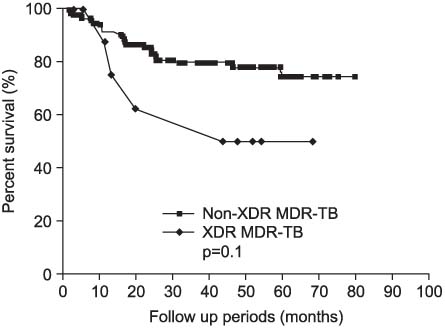Tuberc Respir Dis.
2010 Aug;69(2):95-102.
Treatment Outcomes and Prognostic Factors in Patients with Multidrug-Resistant Tuberculosis in Korean Private Hospitals
- Affiliations
-
- 1Department of Pulmonary and Critical Care Medicine, Asan Medical Center, University of Ulsan College of Medicine, Seoul, Korea. shimts@amc.seoul.kr
- 2Korean TB Study Group, Korean Academy of Tuberculosis and Respiratory Diseases, Seoul, Korea.
- 3Department of Pulmonary and Critical Care Medicine, Ewha Womans University School of Medicine, Seoul, Korea.
Abstract
- BACKGROUND
The increasing rate of drug-resistant tuberculosis (TB) is a threat to the public health and TB control. In Korea, about 75~80% of TB patients are treated in private hospitals and the rate has been continuously increasing since 2000.
METHODS
On a retrospective basis, we enrolled 170 newly diagnosed with or retreated for multidrug-resistant TB (MDR-TB) in 2004 from 21 private hospitals. We extracted the following demographics and treatment history from patient medical records: initial treatment outcomes, cumulative survival rates, treatment outcomes, and prognostic factors.
RESULTS
Of the 170 patients, the majority were male (64.1%), the mean age was 44.5 years old, and mean body-mass-index was 20.2 kg/m2. None of the patients tested positive for HIV. Eleven (6.5%) were confirmed to have extensively drug-resistant TB (XDR-TB) at treatment initiation. Treatment success rates were not different between XDR-TB (36.4%, 4/11) and non-XDR MDR-TB (51.6%, 82/159). Default rate was high, 21.8% (37/170). Far advanced disease on X-ray was a significant negative predictor of treatment success; advanced disease and low BMI were risk factors for all-cause mortality.
CONCLUSION
In private hospitals in Korea, the proportion of XDR-TB in MDR-TB was comparable to previous data. The treatment success rate of MDR-/XDR-TB remains poor and the failure rate was quite high. Adequate TB control policies should be strengthened to prevent the further development and spread of MDR-/XDR-TB in Korea.
Keyword
MeSH Terms
Figure
Reference
-
1. Jeon D, Shin D, Kang H, Sung N, Kweon K, Shin E, et al. Trend of multidrug and extensively drug resistant tuberculosis in a tuberculosis referral hospital, 2001~2005. Tuberc Respir Dis. 2008. 64:187–193.2. World Health Organization. Guidelines for the programmatic management of drug-resistant tuberculosis. 2008. Geneva: World Health Organization.3. Caminero JA. World Health Organization. American Thoracic Society. British Thoracic Society. Treatment of multidrug-resistant tuberculosis: evidence and controversies. Int J Tuberc Lung Dis. 2006. 10:829–837.4. Korea Center for Disease Control and Prevention, Korean Institute of Tuberculosis. Annual report on the notified tuberculosis patients in Korea. 2005. Seoul: Korea Center for Disease Control and Prevention.5. Koh WJ, Kwon OJ, Kim CH, Ahn YM, Lim SY, Yun JW, et al. Clinical characteristics and treatment outcomes of patients with pulmonary tuberculosis at a private general hospital. Tuberc Respir Dis. 2003. 55:154–164.6. Kim DH, Kim HJ, Park SK, Kong SJ, Kim YS, Kim TH, et al. Treatment outcomes and long-term survival in patients with extensively drug-resistant tuberculosis. Am J Respir Crit Care Med. 2008. 178:1075–1082.7. World Health Organization. Extensively drug-resistant tuberculosis (XDR-TB): recommendations for prevention and control. Wkly Epidemiol Rec. 2006. 81:430–432.8. Laserson KF, Thorpe LE, Leimane V, Weyer K, Mitnick CD, Riekstina V, et al. Speaking the same language: treatment outcome definitions for multidrug-resistant tuberculosis. Int J Tuberc Lung Dis. 2005. 9:640–645.9. Migliori GB, Sotgiu G, D'Arcy Richardson M, Centis R, Facchini A, Guenther G, et al. MDR-TB and XDR-TB: drug resistance and treatment outcomes. Eur Respir J. 2009. 34:778–779.10. Park SK, Lee CM, Heu JP, Song SD. A retrospective study for the outcome of pulmonary resection in 49 patients with multidrug-resistant tuberculosis. Int J Tuberc Lung Dis. 2002. 6:143–149.11. Shiraishi Y, Nakajima Y, Katsuragi N, Kurai M, Takahashi N. Resectional surgery combined with chemotherapy remains the treatment of choice for multidrug-resistant tuberculosis. J Thorac Cardiovasc Surg. 2004. 128:523–528.12. Kim HR, Hwang SS, Kim HJ, Lee SM, Yoo CG, Kim YW, et al. Impact of extensive drug resistance on treatment outcomes in non-HIV-infected patients with multidrug-resistant tuberculosis. Clin Infect Dis. 2007. 45:1290–1295.13. Kwon YS, Kim YH, Suh GY, Chung MP, Kim H, Kwon OJ, et al. Treatment outcomes for HIV-uninfected patients with multidrug-resistant and extensively drug-resistant tuberculosis. Clin Infect Dis. 2008. 47:496–502.14. Rivers EC, Mancera RL. New anti-tuberculosis drugs with novel mechanisms of action. Curr Med Chem. 2008. 15:1956–1967.15. Diacon AH, Pym A, Grobusch M, Patientia R, Rustomjee R, Page-Shipp L, et al. The diarylquinoline TMC 207 for multidrug-resistant tuberculosis. N Engl J Med. 2009. 360:2397–2405.16. Koh WJ, Kwon OJ, Gwak H, Chung JW, Cho SN, Kim WS, et al. Daily 300 mg dose of linezolid for the treatment of intractable multidrug-resistant and extensively drug-resistant tuberculosis. J Antimicrob Chemother. 2009. 64:388–391.17. Park IN, Hong SB, Oh YM, Kim MN, Lim CM, Lee SD, et al. Efficacy and tolerability of daily-half dose linezolid in patients with intractable multidrug-resistant tuberculosis. J Antimicrob Chemother. 2006. 58:701–704.
- Full Text Links
- Actions
-
Cited
- CITED
-
- Close
- Share
- Similar articles
-
- The survey for clinical course of intractable pulmonary tuberculosis
- Multidrug-resistant Tuberculosis Spondylitis: A Case Report
- Multidrug-resistant Tuberculosis
- Risk Factors for Primary Multidrug Resistant Tuberculosis
- Drug Resistance Patterns of Multidrug- and Extensively Drug-Resistant Tuberculosis in Korea: Amplification of Resistance to Oral Second-line Drugs


